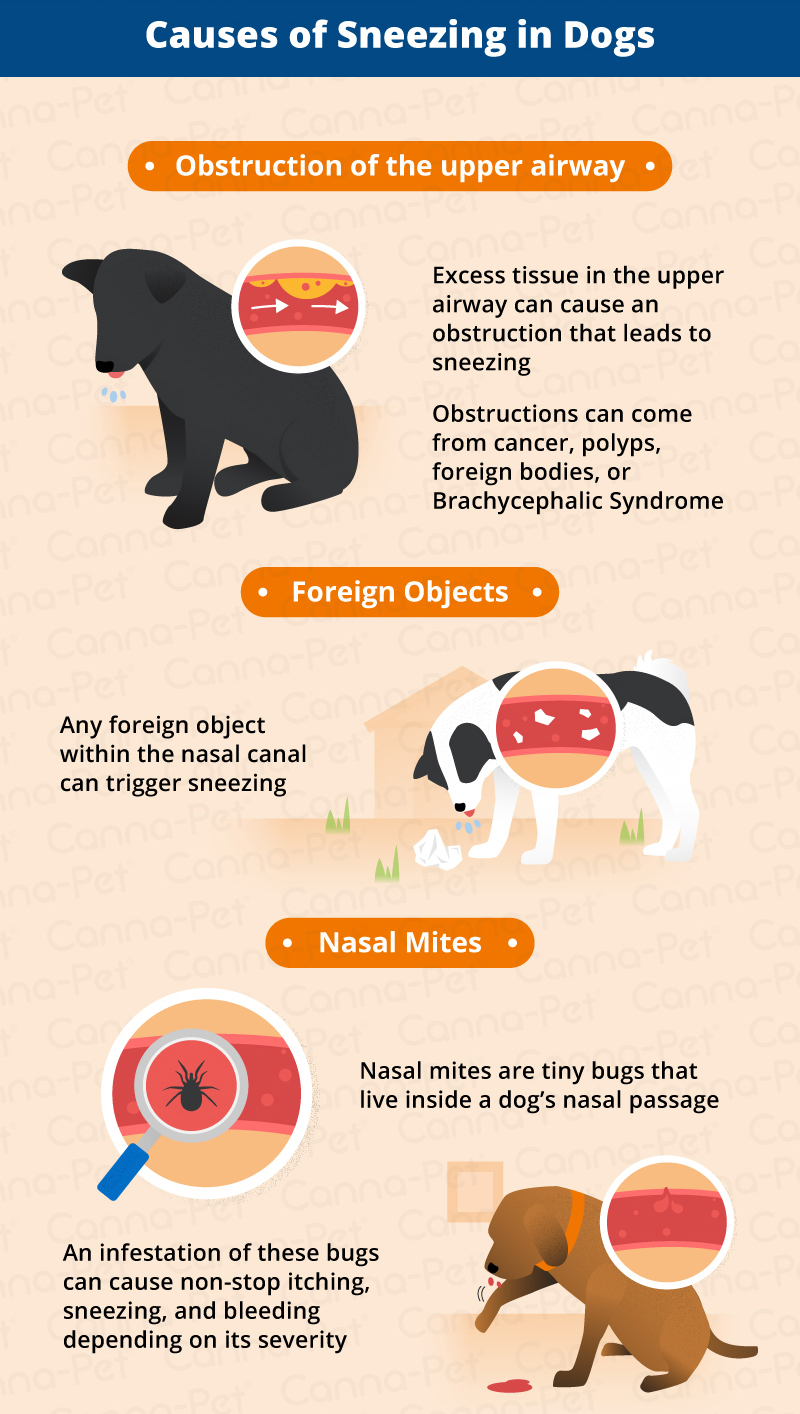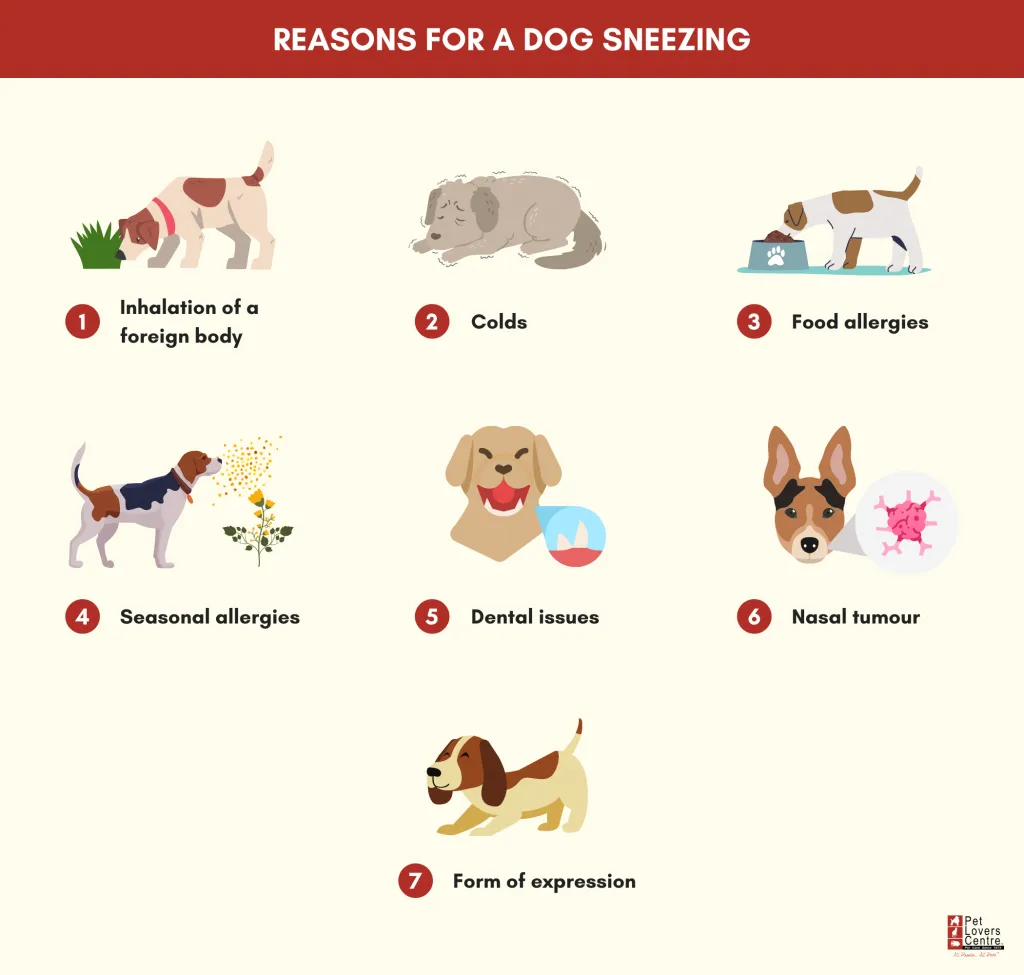If your dog is sneezing more than usual, it could be a sign of allergies, tumors, reverse sneezing, infections, nasal mites, dental issues, or foreign bodies. Sneezing in dogs can also be a form of communication, such as when they are playing or excited.
However, if your dog is sneezing a lot or has other signs of concern, like nose bleeds, discharge, or signs of discomfort, it is recommended to consult with a vet to determine the underlying cause and appropriate treatment. Treatment may involve antibiotics, nasal decongestants, antihistamines, or other medications depending on the diagnosis.
Remember to keep an eye on your dog’s overall health and seek veterinary advice if needed.
Causes Of Dog Sneezing
If you notice your dog sneezing more than usual, it could be due to allergies, infections, tumors, or dental issues. It’s best to consult your vet if your dog is sneezing excessively or experiencing other concerning symptoms.
Allergies
One of the common causes of dog sneezing is allergies. Just like humans, dogs can be allergic to various substances in the environment. These allergens can include pollen, dust mites, mold, certain foods, and even certain medications. When your dog encounters an allergen, it can trigger a sneezing response as their body tries to eliminate the irritant. Common signs of allergies in dogs include sneezing, itching, red eyes, and nasal congestion. If you suspect that your dog has allergies, it’s important to consult with your veterinarian to determine the specific allergens and develop a suitable treatment plan.Tumors
Another less common but more serious cause of dog sneezing is the presence of tumors. Tumors in the nasal passages or sinus cavities can lead to chronic sneezing in dogs. These tumors can be benign or malignant, and they can interfere with your dog’s normal breathing and overall quality of life. If your dog is experiencing persistent sneezing along with other concerning symptoms like nosebleeds, facial swelling, or weight loss, it is crucial to seek veterinary attention. Your vet may recommend further diagnostic tests, such as X-rays or biopsies, to determine the cause of the sneezing and develop an appropriate treatment plan.Reverse Sneezing
While it may sound alarming, reverse sneezing is a common and harmless cause of dog sneezing. Reverse sneezing occurs when dogs have a sudden, forceful inhalation through the nose. It is often triggered by irritation or inflammation in the nasal passages or throat. During reverse sneezing, your dog may make a snorting or honking sound, extend their neck, and act as if they are trying to clear something from their airway. Although reverse sneezing itself is not a cause for concern, it is essential to monitor your dog to ensure it does not become prolonged or frequent. If your dog experiences frequent or prolonged reverse sneezing episodes, it is advisable to consult with your veterinarian to rule out any underlying respiratory issues.Infections
Respiratory infections, such as viral or bacterial infections, can also lead to dog sneezing. These infections can cause inflammation in the nasal passages and increase mucus production, triggering sneezing as the body tries to expel the invading pathogens. Common signs of respiratory infections in dogs include sneezing, coughing, nasal discharge, and lethargy. If you suspect that your dog has an infection, it is important to consult with your veterinarian for a proper diagnosis and appropriate treatment. In some cases, antibiotics or antiviral medications may be necessary to help your furry friend recover.Nasal Mites
Although relatively rare, nasal mites can contribute to sneezing in dogs. Nasal mites are tiny parasites that reside in the nasal passages or sinuses and can cause irritation and inflammation. They can be transmitted through close contact with infected dogs or contaminated environments. If your dog is experiencing persistent sneezing, nosebleeds, nasal discharge, or facial rubbing, it is essential to consult with your veterinarian. They may perform a thorough examination and recommend specific tests to detect the presence of nasal mites. Treatment usually involves medications that target the mites and alleviate the associated symptoms.Prevention And Treatment
If your dog is sneezing more than usual, it’s important to address the issue to ensure their health and well-being. Sneezing can be a sign of various underlying causes, including allergies, tumors, infections, or the presence of foreign bodies. In this section, we will discuss some common prevention and treatment options to help alleviate your dog’s sneezing and promote a healthy life for your furry friend.
Preventing Pet Sneezing
Preventing your dog from sneezing can involve various measures, depending on the cause. Some common preventive steps you can take include:
- Keeping your dog’s environment clean and free from dust, allergens, and irritants
- Regularly cleaning your dog’s bedding and toys to minimize exposure to potential triggers
- Ensuring proper ventilation in your home to reduce indoor air pollutants
- Providing a balanced and nutritious diet to strengthen your dog’s immune system
Dental Issues
Poor dental hygiene can contribute to sneezing in dogs. Dental problems such as gum disease or tooth abscesses can lead to infections, which can in turn cause sneezing. Regular dental care, including brushing your dog’s teeth and regular check-ups with a veterinarian, can help prevent sneezing associated with dental issues.
Foreign Bodies
Sneezing can also occur when foreign objects, such as grass seeds or small particles, get lodged in your dog’s nasal passages. If you suspect that a foreign body may be the cause of your dog’s sneezing, it’s important to consult with a veterinarian who can safely remove the object and provide the necessary treatment.
Nasal Infection
Nasal infections, such as bacterial or viral infections, can cause persistent sneezing in dogs. If your dog is experiencing recurrent sneezing accompanied by nasal discharge, it’s crucial to seek veterinary attention. Your veterinarian may prescribe antibiotics or other appropriate medications to treat the underlying infection.
Treatment Options
The treatment for your dog’s sneezing will depend on the underlying cause. Here are some common treatment options that your veterinarian may recommend:
- Antibiotics to treat bacterial infections
- Nasal decongestants to alleviate nasal congestion
- Antihistamines to manage allergies
- Appetite stimulants to improve your dog’s overall health and immune system
- Subcutaneous or intravenous fluids to provide hydration and support during treatment
When To Be Concerned
If you’ve noticed that your dog is sneezing more often than usual, you might be wondering if it’s something to be concerned about. While occasional sneezing can be normal for dogs, excessive sneezing could indicate an underlying issue that requires attention. In this article, we will discuss the symptoms to watch for, when to see a veterinarian, and the seriousness of excessive sneezing.
Symptoms To Watch For
Bleeding Nose: If you observe blood coming from your dog’s nose during sneezing episodes, this could be a red flag. Nosebleeds indicate a potential injury, infection, or even certain types of tumors.
Wet or Dry Nose: Pay attention to the moisture level of your dog’s nose. If it’s excessively wet or dry, it could be a sign of an underlying issue.
Discharge: Watch for any unusual discharge from your dog’s nose. Green or yellow mucus might be a sign of infection, while clear discharge may indicate allergies.
Discomfort: Keep an eye out for any signs of discomfort while your dog sneezes. Excessive pawing at the face or rubbing against furniture could indicate that something is bothering them.
When To See A Veterinarian
If your dog is experiencing any of the symptoms mentioned above, it’s important to consult a veterinarian. Additionally, if your dog’s sneezing persists for more than a few days without improvement, professional advice is advisable.
Your veterinarian will perform a thorough examination and may recommend further diagnostic tests to identify the underlying cause of your dog’s excessive sneezing. They will be able to provide you with the appropriate treatment plan or prescribe medications, if necessary.
Seriousness Of Excessive Sneezing
Excessive sneezing in dogs can range from a minor irritation to a serious health concern. It is crucial to identify the underlying cause to determine the appropriate course of action.
While allergies are a common cause of sneezing in dogs, other potential causes include respiratory infections, nasal mites, dental issues, foreign objects lodged in the nose, or even nasal tumors. Some of these conditions may require immediate attention to prevent further complications.
Remember, it is always better to be safe than sorry when it comes to your fur baby’s health. If you are unsure or concerned about your dog’s excessive sneezing, consulting with a veterinarian is the best course of action.

Credit: canna-pet.com
Common Myths About Dog Sneezing
There are several common myths surrounding dog sneezing that can often lead to misconceptions about our furry friends. Let’s debunk some of these myths to better understand why your dog might be sneezing.
Myth: Sneezing Means My Dog Is Sick
Contrary to popular belief, sneezing doesn’t always indicate that your dog is sick. While it’s true that dogs may sneeze when they have a cold or respiratory infection, there are other reasons why your dog might sneeze as well.
For example, dogs may sneeze to get rid of irritants, such as dust or pollen, from their nasal passages. Sneezing can also be a playful behavior, especially when dogs are excited during playtime. Therefore, if your dog sneezes occasionally and doesn’t show any other signs of illness, it’s likely nothing to be worried about.
Myth: Dogs Only Sneeze When They Have A Cold
It’s a common misconception that dogs only sneeze when they have a cold. While respiratory infections can indeed cause sneezing in dogs, there are many other factors that can trigger sneezing episodes.
One common cause of sneezing in dogs is allergies. Just like humans, dogs can be allergic to pollen, dust mites, mold, or certain foods. These allergies can cause nasal irritation, resulting in sneezing as the body’s way of clearing the nasal passages.
Additionally, dogs may also experience episodes of “reverse sneezing,” which is characterized by rapid inhalation through the nose. This is often triggered by excitement, exercise, or as a response to irritants in the air. While it may sound alarming, reverse sneezing is usually harmless and stops on its own.
In summary, sneezing in dogs is not always a cause for concern. It’s important to assess your dog’s overall health and behavior to determine if there are any underlying issues. If your dog’s sneezing is accompanied by other symptoms or appears to be excessive, it’s best to consult with your veterinarian for a proper diagnosis and treatment.
Understanding Seasonal Allergies In Dogs
Exposure to certain outdoor elements or during specific times of the year, it may be experiencing seasonal allergies. It’s best to consult with a veterinarian for proper diagnosis and treatment options.
Common Triggers
Allergies in dogs are quite common, and just like humans, they can experience seasonal allergies. There are several common triggers that can cause allergies in dogs, such as:
- Pollen from trees, grass, or weeds
- Mold spores
- Dust mites
- Insect bites (such as from fleas or mosquitoes)
- Certain foods
Symptoms Of Allergies In Dogs
When dogs are allergic to certain substances, they may exhibit various symptoms. It’s essential to keep an eye on your furry friend and look for the following signs of allergies:
- Sneezing
- Itchy and red skin
- Excessive scratching or licking
- Watery eyes
- Runny nose
- Ear infections
- Hair loss or hot spots
- Chronic ear infections
How To Manage Allergies
Managing allergies in dogs can help alleviate their discomfort and provide them with a better quality of life. Here are some strategies you can use:
- Visit your veterinarian: It is essential to consult your vet to confirm if your dog has allergies and to determine the specific triggers.
- Eliminate or minimize exposure to allergens: If you know the triggers, try to keep your dog away from them. For example, keep them indoors during pollen-heavy days.
- Regular grooming: Frequent baths with a hypoallergenic shampoo can help remove allergens from your dog’s skin and coat.
- Medications: Your vet may prescribe antihistamines, corticosteroids, or other medications to help manage your dog’s allergies.
- Allergy shots: In some cases, your veterinarian may recommend immunotherapy, or allergy shots, to desensitize your dog to specific allergens.
By implementing these management techniques, you can help keep your dog’s allergies under control and improve their overall well-being.

Credit: blog.petloverscentre.com

Credit: m.facebook.com
Frequently Asked Questions Of Why Is My Dog Sneezing?
Should I Be Worried If My Dog Is Sneezing?
If your dog is sneezing more than usual or showing other signs of concern like nosebleeds or discharge, it’s best to speak to your vet. Dogs may sneeze as a form of communication or when they’re excited, but excessive sneezing could indicate an underlying issue.
Consult your vet for proper diagnosis and treatment.
How Do You Treat A Dog That Sneezes?
If your dog sneezes more than usual and shows signs of discomfort, nose bleeds, or discharge, consult your vet. Treatment may include antibiotics, decongestants, antihistamines, appetite stimulants, or fluids. Sneezing can be a sign of allergies, tumors, infections, or dental issues.
Do Dogs Sneeze When They Are Sick?
Yes, dogs may sneeze when they are sick. In addition to sneezing, they may experience coughing, nasal congestion, watery eyes, runny nose, sore throat, and body aches. If your dog is sneezing excessively or showing other signs of concern, consult a veterinarian.
How Do You Know If Your Dog Has A Cold?
Symptoms of a dog’s cold include sneezing, nasal discharge, watery eyes, tiredness, and frequent nose licking. Take short walks and dry your dog thoroughly after being outside. Rest is important. If symptoms worsen or persist, consult your vet. Avoid exposure to wet weather.
Conclusion
A dog’s nose is a telltale sign of their overall health, and sneezing can be a normal reflex or a sign of an underlying issue. Sneezing can be caused by allergies, infections, nasal mites, dental issues, or even foreign bodies.
If your dog is sneezing excessively or showing other concerning symptoms, it’s best to consult with your vet for a proper diagnosis and treatment. Remember, your furry friend’s well-being is worth the extra care and attention.
